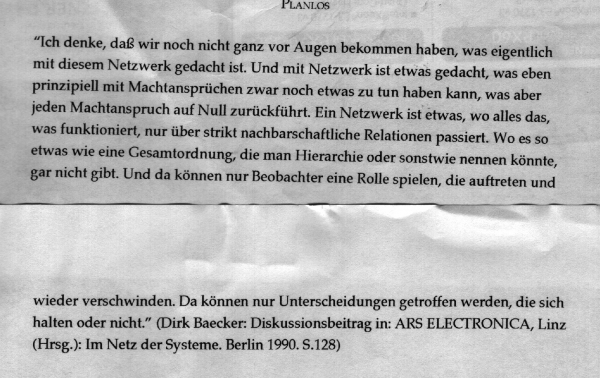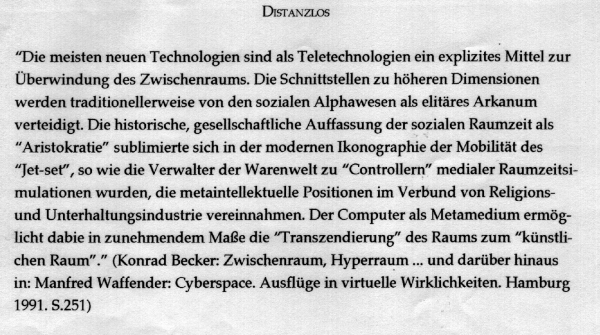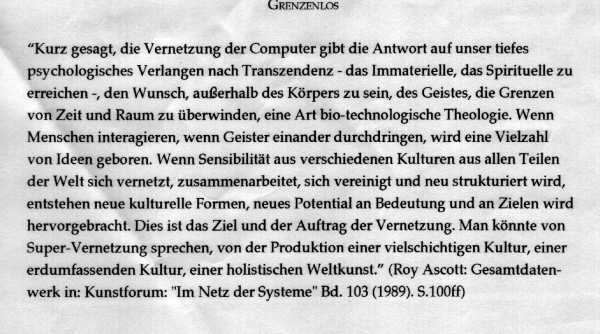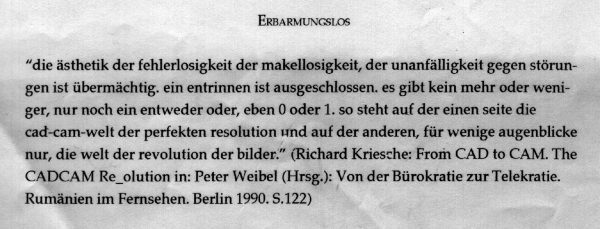Telepräsenz (PhÜD): Unterschied zwischen den Versionen
Anna (Diskussion | Beiträge) K (link) |
Anna (Diskussion | Beiträge) K (→Mediated Presence: first) |
||
| Zeile 23: | Zeile 23: | ||
== [http://21st.century.phil-inst.hu/2002_konf/Hrachovec/hh_tlk.htm Mediated Presence] == | == [http://21st.century.phil-inst.hu/2002_konf/Hrachovec/hh_tlk.htm Mediated Presence] == | ||
| + | |||
| + | === The hype surrounding tele-presence deserves to be taken seriously. === | ||
| + | |||
| + | Captions like Telepresence: A Technology Transcending Time and Space or Telepresence: live, interactive, look where you want video on the Internet evoke flights of metaphysical phantasy together with more robust reflexes, familiar from e-commerce. | ||
| + | |||
| + | William J. Mitchell has noted with respect to the term cyberspace: It's a figure of speech that has emerged to cover a gap in our language. | ||
| + | |||
| + | ::Telepresence is the art of enabling social proximity despite geographical or temporal distances through the integration of computers, audio-visual, and tele-communicative technologies. [http://www.dgp.toronto.edu/tp/tphp.html] | ||
| + | |||
| + | Spatial distance and temporal duration seem indeed to have vanished in the age of global, inter-active telecommunication. It might be objected that networked computers have obviously neither abolished space nor time. True enough, but this objection marks a fallback position without facing the challenge. | ||
| + | |||
| + | === We cannot afford current, easy explanations of tele-presence. === | ||
| + | |||
| + | One way to see the problem is to observe that we cannot make sense of the puzzlement we are faced with without a working distinction between proximity and distance. Paul Virilio complains that: | ||
| + | |||
| + | ::"closer to what is far away than to what is just beside us, we are becoming progressively detached from ourselves." | ||
| + | |||
| + | There is no way to comprehend the complaint but to master the ordinary use of closeness. It has to be presupposed and supplemented with the additional twist suggested by the author. Imagine someone lacking any understanding of closeness: she will not profit by being told that newly available techniques are bringing distant events close to her. We need a concurrent mastery of tele-distance to be able to distinguish between the physical environment and those peculiar impressions we want to classify as close by, yet coming from afar. And we have to keep this separate from the close distance a phenomenologist might want to describe, e.g. the tension arising between persons keeping away from each other in an elevator. | ||
| + | |||
| + | The reason for the confusion often encountered in promotional talk about tele-presence is quite simple. Certain concepts such as left and right or true and false work in pairs, hence the occasional temptation to overstress one component. A notorious example is Baudrillard's universal simulation. Such conceptual extravaganzas almost inevitably lead into dead ends. As soon as it is recognized that deception only makes sense vis a vis knowledge the pendulum swings back: If there is no knowledge, there is no deception either. The dialectics between proximity and distance is a case in point. If we take the abolition of distance and duration as anything but shop talk from media journalists we embark upon a journey that can only end in philosophical embarrassment. | ||
| + | |||
| + | === Our web of belief is under stress. Tele-presence calls for a re-examination of some basic concepts in epistemology. === | ||
| + | |||
| + | |||
---- | ---- | ||
[[Category:Drohnen. SS 2016]] | [[Category:Drohnen. SS 2016]] | ||
Version vom 7. April 2016, 10:25 Uhr
Inhaltsverzeichnis
Phantasien
Mediated Presence
The hype surrounding tele-presence deserves to be taken seriously.
Captions like Telepresence: A Technology Transcending Time and Space or Telepresence: live, interactive, look where you want video on the Internet evoke flights of metaphysical phantasy together with more robust reflexes, familiar from e-commerce.
William J. Mitchell has noted with respect to the term cyberspace: It's a figure of speech that has emerged to cover a gap in our language.
- Telepresence is the art of enabling social proximity despite geographical or temporal distances through the integration of computers, audio-visual, and tele-communicative technologies. [1]
Spatial distance and temporal duration seem indeed to have vanished in the age of global, inter-active telecommunication. It might be objected that networked computers have obviously neither abolished space nor time. True enough, but this objection marks a fallback position without facing the challenge.
We cannot afford current, easy explanations of tele-presence.
One way to see the problem is to observe that we cannot make sense of the puzzlement we are faced with without a working distinction between proximity and distance. Paul Virilio complains that:
- "closer to what is far away than to what is just beside us, we are becoming progressively detached from ourselves."
There is no way to comprehend the complaint but to master the ordinary use of closeness. It has to be presupposed and supplemented with the additional twist suggested by the author. Imagine someone lacking any understanding of closeness: she will not profit by being told that newly available techniques are bringing distant events close to her. We need a concurrent mastery of tele-distance to be able to distinguish between the physical environment and those peculiar impressions we want to classify as close by, yet coming from afar. And we have to keep this separate from the close distance a phenomenologist might want to describe, e.g. the tension arising between persons keeping away from each other in an elevator.
The reason for the confusion often encountered in promotional talk about tele-presence is quite simple. Certain concepts such as left and right or true and false work in pairs, hence the occasional temptation to overstress one component. A notorious example is Baudrillard's universal simulation. Such conceptual extravaganzas almost inevitably lead into dead ends. As soon as it is recognized that deception only makes sense vis a vis knowledge the pendulum swings back: If there is no knowledge, there is no deception either. The dialectics between proximity and distance is a case in point. If we take the abolition of distance and duration as anything but shop talk from media journalists we embark upon a journey that can only end in philosophical embarrassment.



